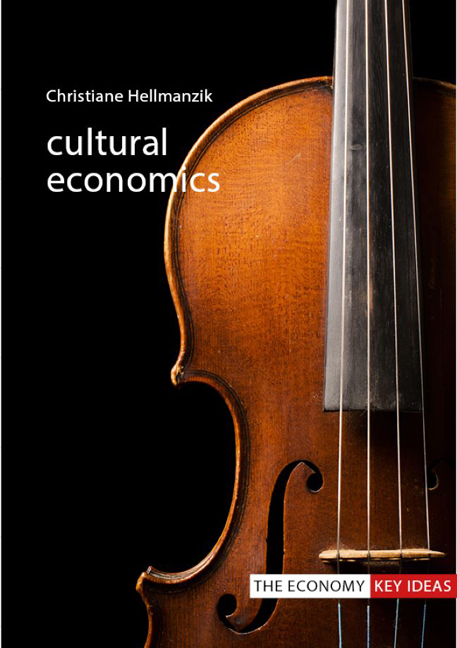Book contents
- Frontmatter
- Contents
- Acknowledgements
- 1 Introducing cultural economics
- 2 Markets, prices and agents
- 3 Society and culture: public provision and institutional aspects
- 4 Demand for culture
- 5 Artists, superstars and creativity
- 6 Quality in the arts and culture
- 7 The organization of cultural industries
- 8 The internet’s impact on cultural sectors
- 9 Globalization’s impact on cultural sectors
- 10 Conclusion
- References
- Index
3 - Society and culture: public provision and institutional aspects
Published online by Cambridge University Press: 20 December 2023
- Frontmatter
- Contents
- Acknowledgements
- 1 Introducing cultural economics
- 2 Markets, prices and agents
- 3 Society and culture: public provision and institutional aspects
- 4 Demand for culture
- 5 Artists, superstars and creativity
- 6 Quality in the arts and culture
- 7 The organization of cultural industries
- 8 The internet’s impact on cultural sectors
- 9 Globalization’s impact on cultural sectors
- 10 Conclusion
- References
- Index
Summary
In this chapter, we will explore the provision of culture – that is, who produces culture and under what conditions. The most important distinction is between the private and public sector roles, both of which engage in the production of culture but do so under very different conditions and often with very different agendas. To be precise, if we start from a market model, set out in the previous chapter, we are thinking of culture as a private good or service that underlies the production logic, as is the case with any other commodity, and is produced by privately owned companies, such as Warner Brothers or Sony Films. Although we have some European film and television networks that are largely public, such as the BBC, the general market mechanisms apply for the music and film industry to a large extent.
However, in some respects this might not capture the whole picture. Consider museums, for example, or theatres and heritage sites; in many countries the state plays an important role in providing these services. Therefore, we are going to have a closer look at what economics offers for the analysis of the public provision of cultural goods. This chapter establishes the difference between private and public entities involved in cultural sectors and the different incentives and agendas that the various stakeholders have in these industries, as well as looking at some practical examples to illustrate the issue.
Culture as a public good
If we think of culture as having positive externalities, meaning culture produces a value above and beyond private consumption, an economist would classify that good or service as a public good. The classic example is that of a well-maintained garden, which makes its owner happy but also affords benefits to the neighbours and the community at large. Thus, it creates benefits beyond the owner's own willingness to pay for plants. Of course, goods can also carry negative externalities, such as noise pollution when neighbours might not be keen on Ed Sheeran blasting through their neighbourhood during an open-air concert.
- Type
- Chapter
- Information
- Cultural Economics , pp. 27 - 42Publisher: Agenda PublishingPrint publication year: 2020

